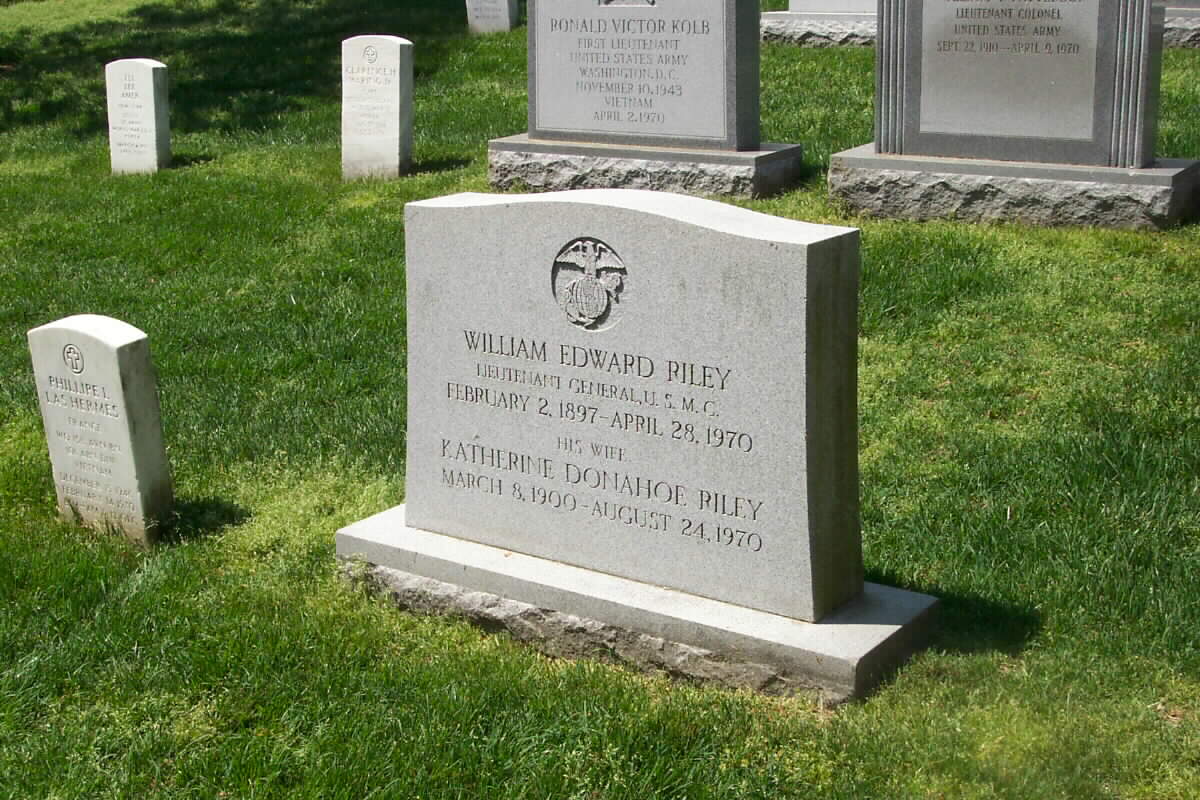Lieutenant General William E. Riley, who retired from active duty, 31 May 1951, died 28 April 1970, at the U.S. Naval Hospital, Annapolis, Maryland. He was 73 years old.
After his retirement, General Riley served as Deputy Director for Management for the Foreign Operations Administration from September 1953, until May 1955. He next served with that administration as Director of the United States Operations Mission in Turkey. During the period from August 1949 until June 1953, he served as Chief of Staff of the United Nations Truce Supervision Organization for Palestine.
General Riley is a veteran of two world wars, with service in many foreign lands during his military career. During World War II, he was decorated three times for his outstanding services. He won the Distinguished Service Medal as Assistant War Plans Officer and later as Assistant Chief of Staff, War Plans, on the staff of Admiral Halsey, Commander, South Pacific Area and South Pacific Force. Later, he was awarded the Legion of Merit for service in a similar assignment when Admiral Halsey commanded the Third Fleet.
The general’s first award in World War II was the Commendation Ribbon, received for outstanding service just after the outbreak of war, on the staff of Admiral King, Commander in Chief, United States Fleet.
His wartime assignments and achievements are illustrated by the following excerpt from a citation: “…General Riley prepared concepts for the occupation of Palau and coordinated the plans the Expeditionary Force Commander with the broader operational plans of the Task Fleet Commander. Because of his grasp of the general situation, he was able to render valuable service to Admiral Halsey as liaison officer to the Commander in Chief, Southwest Pacific Area.”
General Riley was born in Minneapolis, Minnesota, 2 February 1897. He attended the College of St. Thomas at St. Paul and in June 1917, reported for active duty as a Second Lieutenant in the Marine Corps. He reported to the Marine Corps Rifle Range at Winthrop, Maryland.
He sailed for France three months later, and as a member of the Sixth Marine Regiment, took part in the defense of the Verdun Sector, and the Aisne-Marne Defensive and Offensive. In the later campaign, he was wounded for the second time, requiring evacuation to the United States in December, 1918. His World War I decorations include the Silver Star, Oak Leaf Cluster in lieu of a Second Silver Star, and the Croix de Guerre with Gold Star.
Between wars his duties included service in Haiti, Puerto Rico, Santo Domingo, and Cuba. Between tours abroad, he was graduated from the Army Infantry School, and Command and General Staff School, and the Naval War College.
In 1940, he went to sea as Fleet Marine Officer, Atlantic Fleet, remaining until 1942, when he joined the War Plans Division of Admiral King’s staff at Washington.
A year later, he entered a series of important assignments in the Pacific which culminated in command of the Third Marine Division. He served as Director, Division of Public Information and Division of Recruiting at Marine Corps Headquarters, from June 1946, to 31 May 1948, at which time he was detached to the Second Marine Division, Camp Lejeune, North Carolina.
In the summer of 1948 he was temporarily attached to the United Nations Mediation Commission in Palestine, and on 1 August 1949, he was detached to Marine Corps Headquarters for administrative purposes, although still on duty in the Mediterranean with the State Department.
In addition to the Distinguished Service Medal, Letter of Commendation with Ribbon, Silver Star Medal and Oak Leaf Cluster in lieu of a Second Silver Star, and the Croix de Guerre with Gold Star, his decorations and medals include several foreign awards including the Purple Heart with Oak Leaf Cluster, Victory Medal, Asiatic-Pacific Campaign Medal, American Campaign Medal, World War II Victory Medal, American Defense Service Medal, and the Philippine Liberation Ribbon.
General Riley was buried with full military honors in Section 5 of Arlington National Cemetery. His wife, Katherine Donahoe Reily (8 March 1900-24 August 1970) is buried with him.
Michael Robert Patterson was born in Arlington and is the son of a former officer of the US Army. So it was no wonder that sooner or later his interests drew him to American history and especially to American military history. Many of his articles can be found on renowned portals like the New York Times, Washingtonpost or Wikipedia.
Reviewed by: Michael Howard

